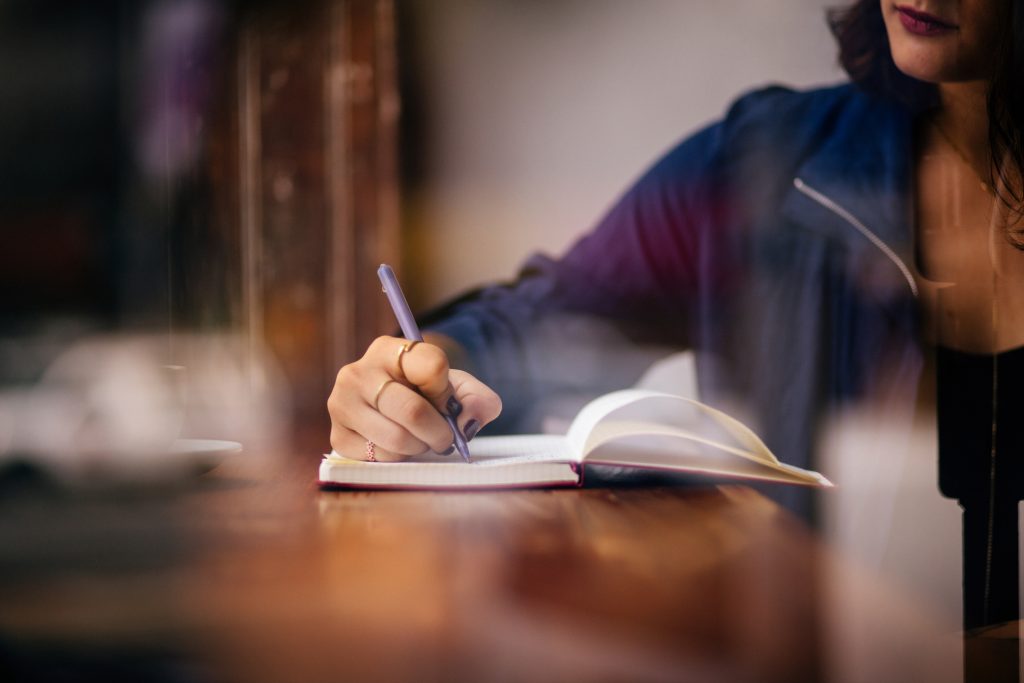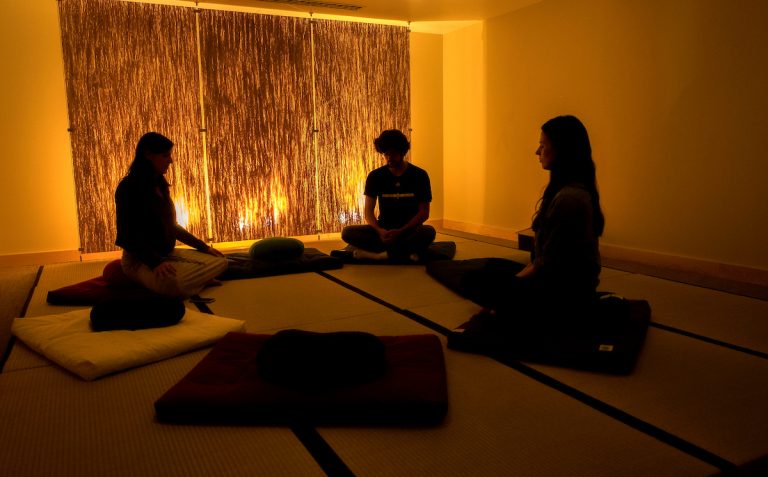The good news is that there are easy routines you may acquire that help keep you on track and clear your thoughts. These practises are part of relaxation, which is as important as labour. Why is it so vital to live, relax, and be mindful? Mindfulness exercises will help you become more attentive, and the best way to achieve this is to create habits that function. Being aware of your life saves you from racing through it and squandering all of its potential. Mindfulness means being aware of your thoughts, emotions, and behaviours at any given time. It’s about seizing the day to better yourself and the world around you.
Journaling:
Many people swear by daily journaling to help them relax and empty their minds of thoughts and worries.
When and how to journal?

Brunette Woman sitting and writing in her journal on wooden counter top window seat in busy coffee shop
You can use a note-taking or journaling app, software like Notion, or plain old pen and paper.
If you want to “brain dump” and write down everything that’s on your mind — good, bad, and worrying — then your diary is the place for you. Writing things down makes them more tangible, and you can work on concrete things more easier than you can with a fleeting concept.
When you journal, always think about what you are grateful for and try to list three things every day (not the same things!).
This exercise will quickly become a habit and a more positive way of looking at your life and the world.
No need to journal for hours every day. Take a few minutes in the morning or evening before bed to journal. Using a journaling app allows you to record your ideas and experiences.
Ideas for starting your journal:
You may be wondering what to write now that you have a blank page or screen. This is especially true if you’ve never journaled (or if you’ve just ever journaled your crush’s name and hearts).
Here are some journaling ideas to get you started:
- How did you show love and kindness today?
- What can you do tomorrow or this week to make the world a little nicer? (This can be as simple as calling an old friend or acquaintance to see how they are.)
- What is your favourite hobby or activity, and why?
- Which season do you prefer?
- Where do you hope to be next year? What steps can you take to achieve this goal?
Meditation and Prayer:
While people have been turning to meditation and prayer for thousands of years and have found (sometimes massive) benefit from it, science is only now starting to catch up and understand what goes on in the brain and body while you meditate or pray.
Dr. David Spiegel from Stanford University, who is the Associate Chair of Psychiatry and Behavioral Sciences, said that: “Praying involves the deeper parts of the brain … the mid-front and back portions“. This can be seen through magnetic image resonance (MRI) and it’s these parts of the brain that is involved in reflection — in self-reflection and self-soothing.
This deep reflection during meditation and prayer can help you to deal with stress, negative situations, and trauma in a positive way — not least because it makes you stop and think twice before doing something.
Focusing during meditation and prayer prevents you from going into “fight or flight” mode, but into a deliberate, aware state. Hokemeyer adds that this re-engages the executive function area of the brain, leading to more thoughtful decisions.
Imagine the amazing influence everyday meditation or prayer can have on you and your thoughts!
Meditation can also help with:
- Anxiety
- Anxiety in Public
- Phobias
- OCD symptoms
Self-massage (Abhyanga):
Self-massage, or abhyanga in Ayurveda, is not only relaxing and good for your skin, but it also renews and rejuvenates the body and mind by flushing out impurities and poisons.
How to self-massage at home:
- Make sure the environment you’re in is warm enough for you, like the bathroom after a hot bath.
- Fill a dish with warm water and your massage oil (closed to prevent spillage). Wait 15 minutes for the oil to warm up.
- Start massaging your body with sweeping strokes and steady pressure, starting with your scalp.
- After you’ve finished the massage, wash away the oils and pollutants with a relaxing bath or shower.
Cold Showers:
You’re probably thinking to yourself, “the what now?” when you see the words “cold showers.” However, taking cold showers has been demonstrated to provide a number of health benefits, including:
- Increased endorphins
- Helps to improve metabolism and improve circulation
- May strengthen your immune system
- Relieves inflammation
- It wakes you up fast
Conscious Breathing
We breathe about 23,000 times every day, yet most of the time we aren’t aware of it. However, being mindful or conscious of your breathing can help you feel less anxious and stressed while also providing you with more energy.
Conscious breathing is accomplished through a series of breathing exercises that we’ll go into later. You can start with 2 to 5 minutes of mindful breathing a few times a day, and you can even put it on your schedule or habit tracker to be sure you do it. You can check and download the app of www.breathwrk.com for guided breathing exercise techniques.
Here are 9 breathing exercises recommended by Healthline that you might try:
- Pursed lip breathing
- Diaphragmatic breathing (belly breathing)
- Lion’s breath (simhasana)
- Alternate nostril breathing (nadi shodhana pranayama)
- Equal breathing (sama vritti)
- Resonant breathing
- Deep breathing
- Sitali breath
- Humming bee breath
Mindful Eating:
When was the last time you savoured your meal? Truly contemplating each bite, all of the various flavours and textures, and focusing solely on your food rather than the latest series you’re watching?
Eating attentively is beneficial not just for avoiding overeating at each meal, but also for grounding yourself in the present and truly living in the present. It entails paying attention to your body and all of your senses when eating even the most basic foods.
Take a bite-sized piece of fruit or dried fruit — for example, a raisin — and consume it while sitting comfortably as one of the mindfulness exercises. Take a moment to examine the raisin in your hand and feel the texture between your fingertips. Close your eyes and concentrate solely on the flavour, texture, and aroma.
Instead of gulping down food at your desk during lunch, try doing this at every meal or snack.
Listening to Music:
Music and mindfulness are described as “complimentary practises” by Psychology Today, and they are absolutely correct. If you let it and use it correctly, music may actually calm the spirit.
While many coping strategies for dealing with stress can be harmful (such as using drugs and alcohol or engaging in other self-destructive behaviour), listening to music can have amazing, positive, and healthy results.
Reaching “flow state” using music:
Getting the correct auditory environment around you, whether it’s Baroque music, Gregorian chant, lo-fi beats, ASMR simulating a coffee shop or Ravenclaw common room, or the ambiance of Skyrim, is critical if you want to easily attain “flow state” and stay in this deep work state while working.
You may utilise YouTube to find Classical music, ambient music, and ASMR channels to assist you figure out which music or noises work best for you.



